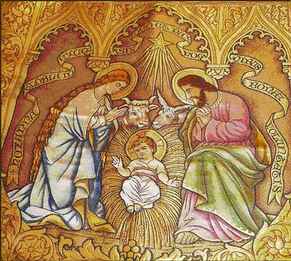Thoughts on the Incarnation. . .
From St. Jerome: He found no room in the Holy of Holies that shone with gold, precious
stones, pure silk and silver. He is not born in the midst of gold and
riches, but in the midst of dung, in a stable where our sins were filthier than the dung.
He is born on a dunghill in order to lift up those who come from it:
“From the dunghill he lifts up the poor.” (Ps 113:7 (112:7 LXX). [On the Nativity of the Lord]
From Gaius Marius Victorinus: As there is a fullness in things, so there is in time. For each thing
has its fullness in a full and copious perfection that abounds in
everything. Christ is the fullness of things. The fullness of times is
the consummation of freedom. So that His fullness may be whole and
perfect Christ collects His members who are scattered, and in this way
His fullness is achieved. So in the same way the fullness of times was
achieved when all had become ripe for faith and sins had increased to the utmost,
so that a remedy was necessarily sought in the judgment of all things.
Hence Christ came when the fullness of time was completed. [Epistle to the Galatians 2.4.3-4]
From St. Ambrose: He was a baby and a child, so that you may be a perfect man. He was
wrapped in saddling cloths so that you be freed from the snares of
death. He was in a manger so that you may be in the altar. He was on
earth that you may be in the stars. He had no other place in the inn so
that you may have many mansions in the heavens. “He, being rich, became
poor for your sakes that through His poverty you might be rich”. (2 Cor
8:9) Therefore His poverty is our inheritance, and the Lord’s weakness
is our virture. He chose to lack for Himself that He may abound for all.
The sobs of that appalling infancy cleanse me, those tears wash
away my sins. Therefore, Lord Jesus, I owe more to your sufferings
because I was redeemed than I do to works for which I was created….
You see that He is in swaddling clothes. You do not see that He is in
heaven. You hear the cries of an infant, but you do not hear the lowing
of an ox recognizing its Master, for the ox knows his Owner and the
donkey his Master’s crib. [Exposition of the Gospel of Luke 2.41-42]
From St. Jerome: The Lord is born on earth, and He does not even have a cell in which to
be born, for there was no room for Him in the inn. The entire human race
had a place, and the Lord about to born on earth had none. He found no
room among men. He found no room in Plato, none in Aristotle,
but in a manger, among beasts of burden and brute animals, and among the
simple too, and the innocent. For that reason the Lord says in
the Gospel, “The foxes have dens, and the birds of the air have nests,
but the Son of Man has nowhere to lay His head.” (Luke 9:58). [Homilies on the Gospels 1.6]

No comments:
Post a Comment